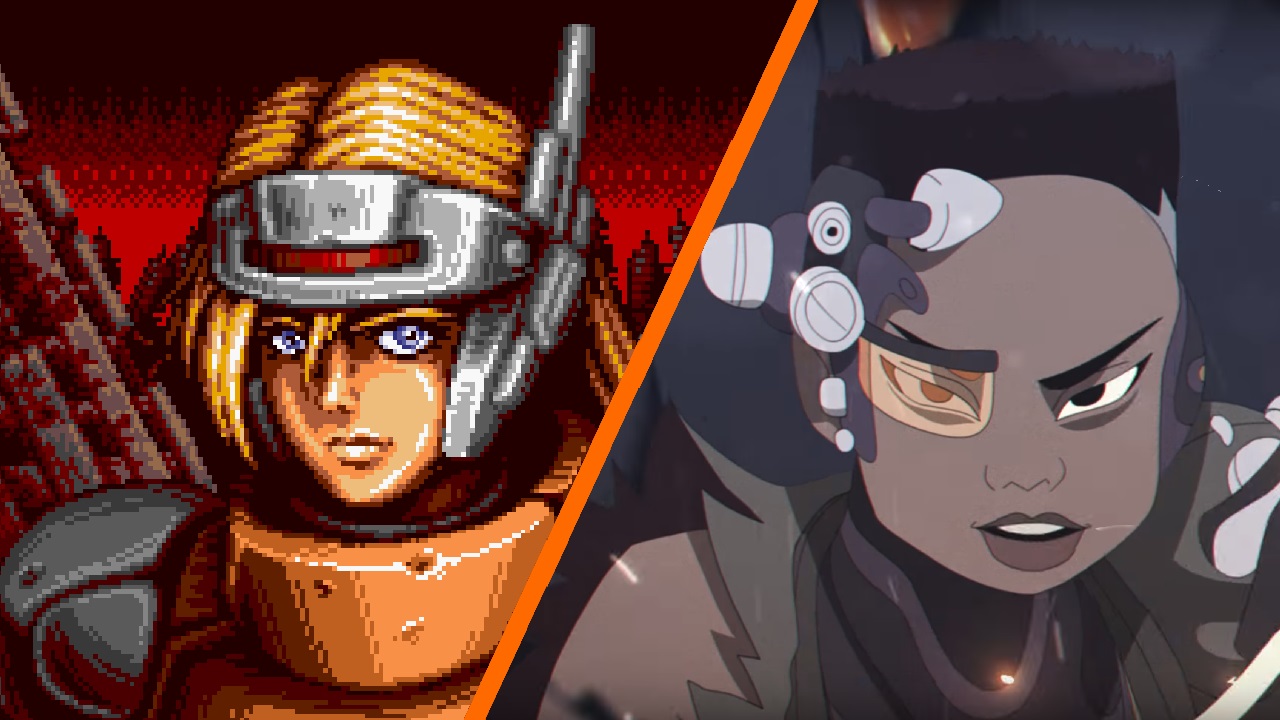
We're in a bit of a nostalgia boom right now, with shows like Stranger Things on our televisions, Funko Pops on our shelves, and Ready Player One (almost) in our cinemas. And of course, games aren't being left the odd man out; just today, two retro-themed sidescrolling shooter games, each leaning heavily on late '80s / early '90s tropes, were announced.
They're both from small teams. Both support co-op. Both take place in post-apocalyptic futures laden with synth beats, neon laser beams, and shoulder pads. Both are coming to PC in 2018 (and hopefully consoles as well, though neither is confirmed just yet). But most importantly, they both look sick as hell. Because I seriously can't pick which one I want to show you first, I'm just going to do this alphabetically. Here's Black Future '88:
The debut title from developer SuperScarySnakes, Black Future '88 puts you in the dirty, leather (probably spiked) boots of one of five survivors of the apocalypse. With the sun permanently blocked out by nuclear winter and your heart about to explode, you'll need to race to the top of a tower, fighting traps and minions along the way. Your ultimate goal: kill Duncan, the architect of the tower and the one who caused the global catastrophe.
The ultra-fast action and pulsing soundtrack give me some serious Hotline Miami vibes, while roguelite features such as the tower being procedurally generated (meaning your journeys should never be the same) and upgrades which let you customize your run (allowing you to experiment with unique loadouts that suit your playstyle) have me extra intrigued. I can't count the number of times I played through Rogue Legacy, so if Black Future '88 can give me that but with neon laser cannons and toe-tapping beats, all presented with super slick pixel graphics, I'm in.
Next up is Blazing Chrome:
If Black Future '88 is the video game version of The Running Man, Blazing Chrome is Mad Max. Instead of a dystopian cyberpunk society brimming with technology, this game presents a world where humans have long been dethroned as the dominant lifeform on the planet. Machines rule everything, and only a resistance fighter named Mavra and a rogue bot named Doyle can put down the oppressive regime.
Blazing Chrome is a bit more true to games of the SNES and Genesis / Mega Drive era, with big, chunky sprites and gameplay that's a bit slower than many modern titles. That doesn't make it any less hectic though, as there are tons of bullets, bombs, and laser blasts hurtling your way at any given time. The soundtrack is an exciting mix of chiptune synth beats, and likewise feels like something you could've heard on a game from that period.
Sign up to the GamesRadar+ Newsletter
Weekly digests, tales from the communities you love, and more
Seriously, if you had shown me gameplay of this and I didn't know better, I would assume I was looking at some long-lost Genesis cartridge that was found under the shelves of a Blockbuster Video. It really looks like a game pulled through time.
But really, what gets me excited (and I hope you too) is that we have two games that could easily be summed up in the same way - "retro-themed 2D co-op shooter set in the post-apocalypse" - and yet look how different they are from each other. We may be in a nostalgia boom, but that doesn't mean the stifling of creativity. These games show that, and I'll be keeping my eyes on both.
Get the best games and entertainment news, reviews, tips and offers delivered to your inbox every week by signing up to the GamesRadar+ newsletter today.
Sam is a former News Editor here at GamesRadar. His expert words have appeared on many of the web's well-known gaming sites, including Joystiq, Penny Arcade, Destructoid, and G4 Media, among others. Sam has a serious soft spot for MOBAs, MMOs, and emo music. Forever a farm boy, forever a '90s kid.



